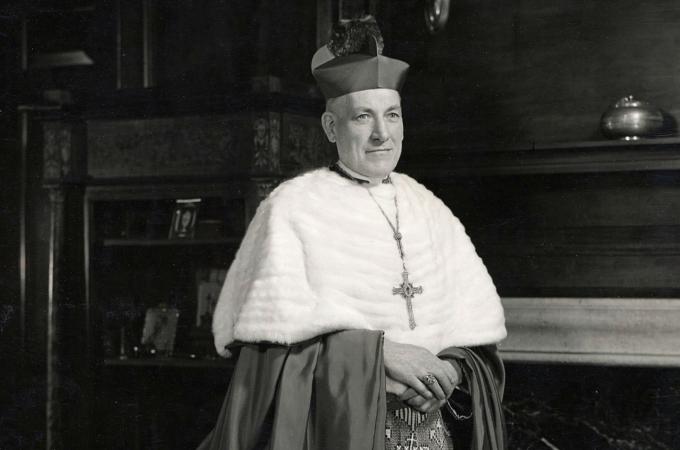Cardinal Cushing's sermon on St. Thomas Aquinas
On March 7, 1959, Cardinal Richard J. Cushing delivered a sermon during an evening Mass at St. Paul's Church, Cambridge. It was the Feast of St. Thomas Aquinas, patron saint of scholars and schools and, appropriately, the Mass was sponsored by local college students. In his sermon, Cardinal Cushing drew upon the teachings of St. Thomas Aquinas, emphasizing the importance of learning and the application of knowledge as it relates to Church doctrine.
St. Thomas Aquinas is believed to have been born in Roccasecca, Italy, near Monte Cassino, around A.D. 1225. He was born to Landolfo of Aquino and Teodora of Cieti, and had eight siblings -- five sisters and three brothers.
He spent his earliest years in Roccasecca. However at age five, rather than follow the path of his father and three brothers, all of whom were soldiers and civil servants in the Holy Roman Empire, he was sent to the Benedictine abbey atop Monte Cassino in the hope he would eventually become an abbot there. His family's plans were interrupted by Frederick II, the Holy Roman Emperor, who forced the Benedictines to abandon the abbey while he occupied it as a fortress.
St. Thomas Aquinas, along with the others who had been studying at the abbey, were sent to Naples to complete their studies. While there, he felt called to the Dominican Order, admiring their proclivity towards poverty, study, and service to the Church. His family, seeing him stray from the path they laid before him, tried to intervene, and intercepted him on the road with his fellow Dominican friars. He was detained at home, but refused to be swayed from his true calling, and they eventually acquiesced to his wishes.
Upon leaving home, he rejoined his order, and studied in both Paris and Cologne under the tutelage of St. Albert the Great, which concluded with his acceptance as a doctoral candidate at the university in Paris. There he completed his earliest writings while a student, and, although under age, at the urging of Pope Alexander IV was granted a license to teach.
After teaching for several years in Paris, he was summoned to the general chapter of the Dominicans in Valenciennes, France, where he took his place alongside the other leading teachers in the country to create the first Dominican "ratio studiorum." This document, which helped standardize the process for educating men entering the order, stemmed from an influx of members who joined without the requisite education.
St. Thomas Aquinas would continue to teach, study, and write over the remaining years of his life. After co-authoring the "ratio studiorum," he returned to Italy for nearly a decade, and then again to Paris around A.D. 1269. Three years later, he was asked to oversee a course of study in Naples, where he lectured until Dec. 6, 1273, when, after Mass, he expressed that he no longer had the will to continue his work. The reason remains unclear, though some attribute it to health problems, perhaps supported by the fact that he passed away several months later, on March 7, 1274, en route to the second Council of Lyons (France).
In the immediate aftermath, there were many claims that miracles happened upon his death, and subsequently to those who visited his tomb. After a thorough investigation, Pope John XXII canonized Thomas Aquinas in 1323, "as much for his doctrine as for the holiness of his life." Later, in 1567, he was elevated to Doctor of the Church by Pope Pius V. His feast day was always observed on March 7 to mark the day of his death, but this often fell during Lent, and was revised in 1969. Since then, it has been observed on Jan. 28.
In his feast day sermon, Cardinal Cushing drew upon St. Thomas Aquinas' teachings, emphasizing the pursuit of knowledge as it relates to our faith, and the practical application of that knowledge in our daily lives. For St. Thomas Aquinas "was not merely a research scholar... [but] he had the power to summarize his teachings in principles which would afford the starting points for further applications."
Regarding the pursuit of knowledge, Cardinal Cushing warned again complacency, and simply assuming that "the Church to which we belong is the true Church which Christ has founded." For "the Catholic who knows nothing about the religion to which he remains loyal is just a step ahead of the Catholic who has fallen away from the Church and just another few steps ahead of the thousands who live and die with no thoughts whatever of the salvation of their souls."
Similarly, he urged us not to blindly accept the Church and its ideals, or to conform to its moral code simply because it is demanded. Rather, speaking to the students, he said many graduates "forget that they have certain debts which they are bound to discharge towards the world." This includes giving an account of the faith which we profess by representing Catholic ideals in each area of our lives, every day of our lives.
Finally, he reminded his audience that "the fruits cannot be gathered unless the roots have sunk deeply into the soul."



















